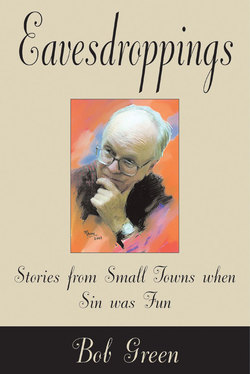Читать книгу Eavesdroppings - Bob Green - Страница 19
На сайте Литреса книга снята с продажи.
Оглавление11 Good Cheer at the Station
Over Christmas and New Year’s the Galt Canadian Pacific Railway station is now the bleakest place in town. Even the freight trains take a holiday. The depot sits dark and silent. What a contrast to the days of passenger trains and steam engines in the 1940s and 1950s when the station was the liveliest place in town.
Hundreds of people went there just to watch passengers coming and going, especially on weekends. Orville Rumble, who wore sunglasses day and night, summer and winter, went there to scout new ladies coming to town. Fish in wooden crates arrived, too, from Port Dover, and Lake Erie and Northern electric cars made it up to the station on a spur line. On holiday weekends sightseers parked their cars on Rose Street and walked to the station. Taxis crowded the parking space close to the platform. Galt Cab, Fraser’s Taxi, De Luxe Cab, and Preston Taxi flocked to the station at train time like gulls to a fish boat.
Holiday trains came in two sections fifteen minutes apart. The first section, made up of old wooden coaches, carried college students. There was a lot of singing on board, and on occasion someone would blow a bugle out the door. The second section, comprised of steel coaches, carried the establishment: businessmen wearing mohair coats, ladies sporting fur hats, magnates in club cars full of cigar smoke, and sometimes in the last two coaches, the Toronto Maple Leafs or Detroit Red Wings hockey teams.
On a Saturday night in winter, back when the late-edition Toronto Star arrived by train, paperboys and girls ran circles around cars as they heaved snowballs. The station had a general waiting room and a separate ladies’ waiting room, presumably a sanctuary for spinsters and nuns and other custodians of virginity. The beer parlours downtown were similarly divided.
“Here she comes!” someone would shout at the first sign of the headlight rising in the east, and everyone in the waiting rooms would rise as if for a hymn, lift their luggage, and jam through the doors to the platform. The awesome steam engines rolled in, bells clanging, brakes screeching, drive rods scissoring over six-foot drive wheels, their weight rattling the station windows.
Westbound trains were usually double-headed, and the smoke from the two engines often made the station disappear in a swirl of sulphurous gas and steam sweetly garnished with superheated valve oil. Little boys and their fathers gathered by the locomotives to bask in the heat and watch the engineer, a celebrity at every stop, oil the drive-rod knuckles and tap the pumps and shafts with a heavy steel mallet here and there like a doctor sounding a patient’s chest.
The conductor hollered “All aboard” and tugged on a cord to sound a peanut whistle in the locomotive cab to tell the engineer to activate the bell and release the brakes. What a thrill to hear those great engines bark and blast their volcanic exhausts skyward, a sight that today would drive environmentalists crazy. Coach after coach slid by faster and faster as did the heads of passengers peering out until suddenly all was quiet and a ghost of steam and red markers faded off across the Grand River bridge.
I remember, as a boy, lying in bed at night listening to freights rumble across the bridge and charge with staccato exhausts up the steep grade to Orr’s Lake. The whistle at Blenheim Road crossing let you know when the engines were about to pass the spring where the hobos camped as the trains battled the toughest stretch of the grade through Barrie’s Cut. The exhausts would slow and sometimes one of the engines would lose its grip and spin its wheels and exhaust like a machine gun until the engineer throttled back and fed more sand to the rails. Sometimes the grade won. The exhausts slowed until the next seemed as if it had to be the last. But there was always one more, and then another. When at last the train gave up, there would be two toots on the whistle and the growing rumble as the engines backed their load down the hill and into the Galt yards for another run.
Frendy Graham, who handled baggage and express for years at the Galt station, said he remembered at least two occasions when engines took off up the grade without their trains, the engineers not realizing it until they reached Orr’s Lake siding. With two engines it was sometimes hard to know which one was doing all the pulling.
It is difficult to realize that two generations of people have never seen a steam train. Those of us lucky enough to have witnessed them and ridden on them can never forget. With a little imagination, as I nod off at night, I can still hear them.
